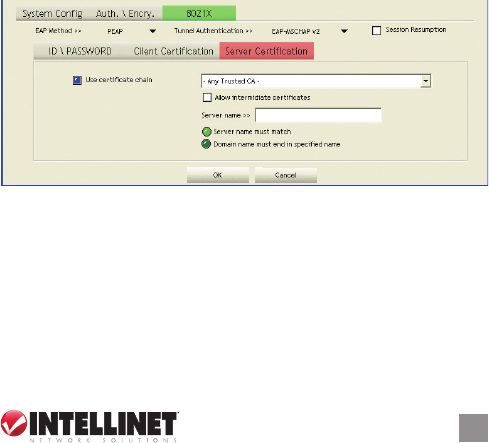
the authentication phase. The server presents a certicate to the
client and, after validating the server’s certicate, the client presents
a client certicate to the server for validation.
Click/check the box to activate or de-activate.
Enter the password as the identity for the server.
A client certicate is required for TLS, but is
optional for TTLS and PEAP. This forces a client certicate to be
selected from the appropriate Windows Certicate Store and made
available to the RADIUS server for certication.
When the authentication type is
PEAP or TTLS, select a protocol for building the encrypted tunnel.
Select one of three options from the drop-
down menu: “EAP-MSCHAPv2,” “EAP-TLS/Smart card” or “Generic
Token Card.”
802.1x se t t i n g /Ca se r v e r
When the Extensible Authentication Protocol
(EAP) authentication type — such as TLS, TTLS or PEAP — is
selected and requires certication to tell the client what credentials to
accept from the authentication server in order to verify the server, you
need to enable this function. Choose the preferred server from the
drop-down menu to issue the certicate. If “Any Trusted CA” is
selected, any CA (certication authority) on the list (which is provided
by the Microsoft Certicate Store) is permitted.
A server designates an issuer as a
trusted root authority by placing the issuer’s self-signed certicate,
CONFIGURATION
17


















